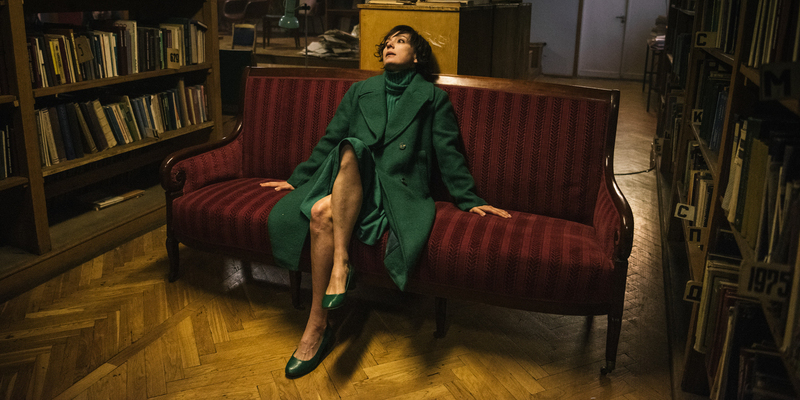
Review by
Eric Hillis
Directed by: Kirill Serebrennikov
Starring: Semyon Serzin, Yuri Kolokolnikov, Yuriy Borisov,
Yuliya Peresild, Chulpan Khamatova

Though he's been working since the late '90s, Russian filmmaker
Kirill Serebrennikov pricked the ears and opened the eyes of
international audiences with his most recent films, 2016's
The Student
and 2018's
Leto. The former was an angry condemnation of Putin's Russia that many
believe was the real reason for him being placed under house arrest soon
after its release. The latter is a loving, nostalgic look back at the
rock scene in Soviet era Russia.
Serebrennikov's latest sees him afforded a bigger budget and
subsequently larger canvas than previous films. The money is certainly
all up on the screen in Petrov's Flu, the cinematic equivalent of a prog rock double concept album with a
gatefold sleeve. Like many prog rock albums, the musicianship is
undeniable but some of the solos outstay their welcome.

Adapted from Alexey Salnikov's novel 'The Petrovs In and Around
the Flu', the sprawling narrative of Petrov's Flu is
chiefly focussed on the titular Petrov (Semyon Serzin), a comic
book artist who spends a very Joycean day wandering his city while
suffering a bad dose of a rapidly spreading flu (yes, it's another
accidentally prescient film for our times).
Petrov's sickness causes him to suffer hallucinations and Serebrennikov
blurs the lines between reality and his protagonist's fever dreams in a
manner that makes you distrust what you're seeing. A dream will flip
back to reality in a single extended take, often switching locations in
a manner that's impossible geographically. From a filmmaking point of
view it's incredibly impressive how Serebrennikov pulls this off, but it
gradually becomes frustrating as our inability to distinguish reality
from fantasy lowers the dramatic stakes. The scenarios Petrov finds
himself in lose weight because we expect him to wake up at any moment
like the hero of a lazy pupil's school essay.

Petrov's librarian wife Petrova (Chulpan Khamatova) similarly
drifts in and out of dreams, though hers are more disturbing. She
imagines herself enacting violence on obnoxious men, and she may well be
an actual serial killer, but also fantasises about slitting her young
son's throat. Again, with so many scenes revealed as fantasy, it's
difficult to become invested in Petrova's plotline.
Elsewhere we're treated to flashbacks to Petrov's childhood in the
Soviet era. Filmed from the perspective of a Tom and Jerry cartoon,
there's something very tangible about how Serebrennikov captures
childhood memories. Through the young Petrov's eyes, the world is
magical, as embodied by a beautiful Snow Maiden (Yulia Peresild)
who presides over a New Year's fancy dress party. It's notable that the
fancy dress party of Petrov's childhood sees the children dressed as
cosmonauts whereas his own son's equivalent bash is populated by kids
kitted out as American superheroes. In the movie's most effective
sequence we get a glimpse into the life of the Snow Maiden and the
troubles unseen by the young Petrov.

Such flashbacks provide an emotional respite from what is otherwise an
unrelentingly cynical view of modern Russia. Petrov is an indifferent
witness to atrocities and testimonies, as though he's the hollowed out
adult embodiment of the little boy from Come and See.
At two and a half hours it's an oppressive experience, but just as you
might begin to feel overwhelmed by drudgery, Serebrennikov pulls off
another dazzling piece of filmmaking. Taking his cues from his
countrymen Tarkovsky and German, the director creates a world that
always seems to be alive around his protagonist, who stumbles in and out
of scenarios followed by the restless camera of cinematographer Vladislav Opelyants. The choreography of scenes is frankly incredible in parts.
Serebrennikov plays his instrument like a virtuoso, but you may wish he
struck some more emotive chords.


